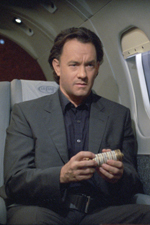
Brandon Judell
The Da Vinci Code
 |
| Tom Hanks stars in Columbia Pictures' suspense thriller "The Da Vinci Code." |
Voltaire, never a huge advocate of organized religion, would be having a fine chuckle nowadays over the current Dan Brown brouhaha. Was Christ just a man or the Son of God? Was Mary Magdalene a prostitute or Jesus' wife and the mother of his daughter? And if the latter is true, would the Church kill to keep such a secret hidden? Well, Lord know, Christians have certainly done a whole lot of slaughtering over the centuries for lesser reasons.
In his introduction to "Candide," Andre Maurois notes Voltaire's stance was "if we are prepared to view the Bible as a collection of legends compiled by barbarian tribes, then he is prepared to admit that it is 'as captivating as Homer.' If we claim to find therein a divine utterance and super-human thoughts, then he claims the right to quote the prophets, and show their cruel savagery."
That savagery, the result of the unwavering righteousness of some religious folks, resounds throughout the novel "The Da Vinci Code," and to an only slightly lesser degree in the film version directed by Ron Howard.
The Gordian knot of a plot has the Bishop Aringarosa (Molina), a leading member of the Catholic sect Opus Dei, sending out his masochistic, mentally askew, albino ward, Silas (Paul Bettany), to acquire the "Holy Grail" from the good guys who might reveal the truth about Christ to the World, thus creating a crisis of faith.
Only Harvard symbology professor Robert Langdon (Hanks) and French police cryptologist Sophie Neveu (Tautou) can save the day. Let the race begin.
Remaining as faithful to the sprawling novel as can be, the film really cannot live up to the expectations of Brown's fans. Happily, though, this effort is not comparable to another adaptation of a best-seller starring Hanks, the blatantly unwatchable "Bonfire of the Vanities."
"The Da Vinci Code" is in comparison constantly thought provoking, visually stunning, musically assured, and yet often less than charismatic. Hanks and Tautou have no chemistry in their scenes together, the dialogue just avoids being camp at times, and the film only really comes alive during its second half when Ian McKellen wobbles in as the crippled, theological expert, Sir Leigh Teabing. McKellen, in an Oscar worthy turn, once again proves why he's one of Britain's grandest living actors.
Mr. Bettany's Silas also must be commended for his brutal self-mortification scenes and his stylish dispatching of his adversaries.
In the end, what we have here is a rather brave film, one that you had to have balls to make in this era of dogmatic religious ferocity, which has clearly overtaken the minds of many of our legislative bodies. Consequently, while some might argue that "The Da Vinci Code" may be considered merely satisfactory as an action film, they certainly must admit it succeeds in provoking a serious discussion of organized religion, which is in the end no doubt more meritorious--and worthy of a Mark-Twain quote:
"Man is a Religious Animal. He is the only Religious Animal. He is the only animal that has the True Religion—several of them. He is the only animal that loves his neighbor as himself and cuts his throat if his theology isn’t straight."
Director: Ron Howard
Screenplay: Akiva Goldsman
Cast: Tom Hanks, Audrey Tautou, Ian McKellen, Alfred Molina, Jurgen Prochnow,
Jean-Yves Berteloot, Etienne Chicot
Copyright © Brandon Judell 2006
| museums | recordings | coupons | publications | classified |